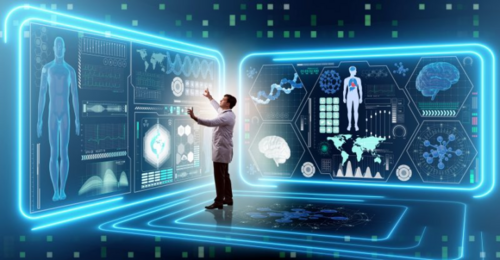

Vaccines are a window into a future of technological dependency where we put into our bodies whatever the authorities tell us to, and wonder why the promise of health, freedom and a return to “normal” is always on the horizon but never here.
Let’s say I’m addicted to prescription pain-killers. You are my concerned friend. “Charles,” you say, “you’ve really got to get off this medication. It’s ruining your health, and someday you’re likely to OD.”
“But I can’t stop taking it. I’m in pain all the time. If I don’t take it I can’t function at all. I have terrible back pain, and my doctor says there is nothing I can do about it.”
If you accept the premises of my response, you’ll have little to say. If we both accept that there is no other way to reduce the pain, and that the cause of the pain is incurable, then I’m right, I have to keep taking the painkiller.
Now let’s talk about glyphosate, the much-maligned herbicide that Monsanto markets as Roundup. Critics make compelling points about its effects on human and ecological health.
Defenders rebut those points, at least to the satisfaction of regulators. The debate has raged now for decades. One point Roundup’s defenders make is this: “Look, Roundup is the most effective broad-spectrum herbicide we have. If we stop using it, crop yields would fall. We would have to use other, less effective herbicides that might be even more toxic to human beings and the environment. Roundup is the safest, most economical option available.”
Here again, if we accept these premises, we are nine-tenths of the way to conceding the argument. By limiting the debate to Roundup itself, its relative harms and benefits, we implicitly accept as a given the entire system of agriculture of which Roundup is a part.
If we take for granted an industrial system of monocrop agriculture, then Roundup’s defenders may be correct. We need Roundup, or something like it, to run the current system. If we don’t change it, then banning Roundup will just result in a switch to other herbicides: new chemicals or genetic technologies that will have their own dangerous side effects.
Most critics of glyphosate are not motivated by the desire to replace it with another herbicide. Rather, glyphosate is a focal point for a critique of the entire system of industrial agriculture.
If we had a system of small-scale, organic, regenerative, ecological, diversified, local agriculture, glyphosate would not be much of an issue, because it would hardly be necessary.
As I amply document in my book, “Climate: A New Story,” this form of agriculture can outperform industrial agriculture in terms of yield per unit of land (although it requires more labor — more gardeners, more small farmers).
So do we need to keep glyphosate or not? If we take the current system of agriculture for granted, then maybe yes. But the conversation we need to be having is about the system itself. If we ignore that, then the glyphosate debate is a distraction.
One might still oppose it on technical grounds, but the most powerful critique is not of the chemical itself, but of the system that requires it.
The good folks at Monsanto probably take the system for granted, and cannot understand how their diligent efforts to make it work a little better are so misunderstood by environmentalists who cast them as villains.
The same pattern applies to what is called “mental health.” Thirteen years ago I wrote an essay, “Mutiny of the Soul,” which described various mental conditions like depression and anxiety as forms of rebellion against an insane world.
By calling those conditions illnesses and treating them with psychiatric medications, we suppress the rebellion and adjust the individual to fit society as it is.
If we accept society-as-it-is as right and good, then of course a maladjusted individual is a sick individual.
If we also take as normal (or fail to see) conditions that make people unhappy — such as social isolation, unresolved trauma, the standard American diet, nature deficit, physical inactivity, or racial, economic or other forms of oppression — then again, we have little alternative but to adjust the individual.
And if we exclude from consideration non-pharmacological forms of “adjustment,”1 then we are left with drugs like SSRIs.
Therefore, those who condemned the article and its sequel were perfectly correct within their frame of reference: “These drugs, while perhaps overused, are powerful and necessary interventions that have rescued many people from depression and allowed them to live normal lives.”
Leaving aside studies in which these drugs fail to outperform placebo, if we hold all other variables constant, one could reasonably argue that they are a beneficial technology, just as glyphosate is in the context of industrial agriculture.2
In a similar vein, those who accept the basic goodness, rightness or inalterability of the current system will see its critics as psychologically infirm.
Quite a few people have, with the kindest of intentions and often quite gently, questioned me about whether my skepticism of vaccines and mainstream medical system merely plays out unresolved childhood wounds around authority.
Am I rebelling against real injustice, or is medical authority a proxy for my father (who wouldn’t let me stay up past my bedtime to watch “All in the Family,” the old tyrant). I might be suffering from Oppositional Defiant Disorder.
To those who accept medical authority as basically good and right, it seems reasonable that my suspicion of it must come from some kind of psychopathology.
The examples of glyphosate and SSRIs illustrate how perfectly decent people can participate in harm simply through their acceptance of the systems and realities that immerse them. Malice is a poor explanation.
Another future beckons. It won’t be handed to us by the same authorities and systems that rule today — we have to claim it. We claim it through the choices it offers.
Which future does your next step lead toward? Toward more normalization of the world under control? Or toward the new normal I’ve described?
The road has forked. It is time to choose.
.jpg)
